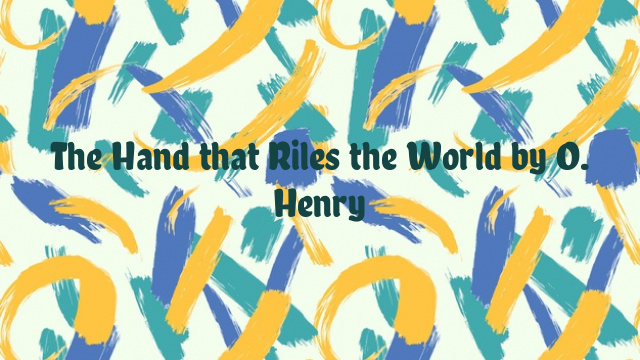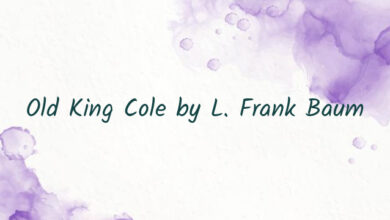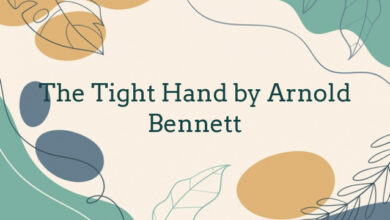
The Hand that Riles the World by O. Henry
“Many of our great men,” said I (apropos of many things), “have declared that they owe their success to the aid and encouragement of some brilliant woman.”
“I know,” said Jeff Peters. “I’ve read in history and mythology about Joan of Arc and Mme. Yale and Mrs. Caudle and Eve and other noted females of the past. But, in my opinion, the woman of to-day is of little use in politics or business. What’s she best in, anyway?–men make the best cooks, milliners, nurses, housekeepers, stenographers, clerks, hairdressers and launderers. About the only job left that a woman can beat a man in is female impersonator in vaudeville.”
“I would have thought,” said I, “that occasionally, anyhow, you would have found the wit and intuition of woman valuable to you in your lines of–er–business.”
“Now, wouldn’t you,” said Jeff, with an emphatic nod–“wouldn’t you have imagined that? But a woman is an absolutely unreliable partner in any straight swindle. She’s liable to turn honest on you when you are depending upon her the most. I tried ’em once.
“Bill Humble, an old friend of mine in the Territories, conceived the illusion that he wanted to be appointed United States Marshall. At that time me and Andy was doing a square, legitimate business of selling walking canes. If you unscrewed the head of one and turned it up to your mouth a half pint of good rye whiskey would go trickling down your throat to reward you for your act of intelligence. The deputies was annoying me and Andy some, and when Bill spoke to me about his officious aspirations, I saw how the appointment as Marshall might help along the firm of Peters & Tucker.
“‘Jeff,’ says Bill to me, ‘you are a man of learning and education, besides having knowledge and information concerning not only rudiments but facts and attainments.’
“‘I do,’ says I, ‘and I have never regretted it. I am not one,’ says I, ‘who would cheapen education by making it free. Tell me,’ says I, ‘which is of the most value to mankind, literature or horse racking?’
“‘Why–er–, playing the po–I mean, of course, the poets and the great writers have got the call, of course,’ says Bill.
“‘Exactly,’ says I. ‘Then why do the master minds of finance and philanthropy,’ says I, ‘charge us $2 to get into a race-track and let us into a library free? Is that distilling into the masses,’ says I, ‘a correct estimate of the relative value of the two means of self- culture and disorder?’
“‘You are arguing outside of my faculties of sense and rhetoric,’ says Bill. ‘What I wanted you to do is to go to Washington and dig out this appointment for me. I haven’t no ideas of cultivation and intrigue. I’m a plain citizen and I need the job. I’ve killed seven men,’ says Bill; ‘I’ve got nine children; I’ve been a good Republican ever since the first of May; I can’t read nor write, and I see no reason why I ain’t illegible for the office. And I think your partner, Mr. Tucker,’ goes on Bill, ‘is also a man of sufficient ingratiation and connected system of mental delinquency to assist you in securing the appointment. I will give you preliminary,’ says Bill, ‘$1,000 for drinks, bribes and carfare in Washington. If you land the job I will pay you $1,000 more, cash down, and guarantee you impunity in boot- legging whiskey for twelve months. Are you patriotic to the West enough to help me put this thing through the Whitewashed Wigwam of the Great Father of the most eastern flag station of the Pennsylvania Railroad?’ says Bill.
“Well, I talked to Andy about it, and he liked the idea immense. Andy was a man of an involved nature. He was never content to plod along, as I was, selling to the peasantry some little tool like a combination steak beater, shoe horn, marcel waver, monkey wrench, nail file, potato masher and Multum in Parvo tuning fork. Andy had the artistic temper, which is not to be judged as a preacher’s or a moral man’s is by purely commercial deflections. So we accepted Bill’s offer, and strikes out for Washington.
“Says I to Andy, when we get located at a hotel on South Dakota Avenue, G.S.S.W. ‘Now Andy, for the first time in our lives we’ve got to do a real dishonest act. Lobbying is something we’ve never been used to; but we’ve got to scandalize ourselves for Bill Humble’s sake. In a straight and legitimate business,’ says I, ‘we could afford to introduce a little foul play and chicanery, but in a disorderly and heinous piece of malpractice like this it seems to me that the straightforward and aboveboard way is the best. I propose,’ says I, ‘that we hand over $500 of this money to the chairman of the national campaign committee, get a receipt, lay the receipt on the President’s desk and tell him about Bill. The President is a man who would appreciate a candidate who went about getting office that way instead of pulling wires.’
“Andy agreed with me, but after we talked the scheme over with the hotel clerk we give that plan up. He told us that there was only one way to get an appointment in Washington, and that was through a lady lobbyist. He gave us the address of one he recommended, a Mrs. Avery, who he said was high up in sociable and diplomatic rings and circles.
“The next morning at 10 o’clock me and Andy called at her hotel, and was shown up to her reception room.
“This Mrs. Avery was a solace and a balm to the eyesight. She had hair the color of the back of a twenty dollar gold certificate, blue eyes and a system of beauty that would make the girl on the cover of a July magazine look like a cook on a Monongahela coal barge.
“She had on a low necked dress covered with silver spangles, and diamond rings and ear bobs. Her arms was bare; and she was using a desk telephone with one hand, and drinking tea with the other.
“‘Well, boys,’ says she after a bit, ‘what is it?’
“I told her in as few words as possible what we wanted for Bill, and the price we could pay.
“‘Those western appointments,’ says she, ‘are easy. Le’me see, now,’ says she, ‘who could put that through for us. No use fooling with the Territorial delegates. I guess,’ says she, ‘that Senator Sniper would be about the man. He’s from somewheres in the West. Let’s see how he stands on my private menu card.’ She takes some papers out of a pigeon-hole with the letter ‘S’ over it.
“‘Yes,’ says she, ‘he’s marked with a star; that means “ready to serve.” Now, let’s see. “Age 55; married twice; Presbyterian, likes blondes, Tolstoi, poker and stewed terrapin; sentimental at third bottle of wine.” Yes,’ she goes on, ‘I am sure I can have your friend, Mr. Bummer, appointed Minister to Brazil.’
“‘Humble,’ says I. ‘And United States Marshal was the berth.’
“‘Oh, yes,’ says Mrs. Avery. ‘I have so many deals of this sort I sometimes get them confused. Give me all the memoranda you have of the case, Mr. Peters, and come back in four days. I think it can be arranged by then.’
“So me and Andy goes back to our hotel and waits. Andy walks up and down and chews the left end of his mustache.
“‘A woman of high intellect and perfect beauty is a rare thing, Jeff,’ says he.
“‘As rare,’ says I, ‘as an omelet made from the eggs of the fabulous bird known as the epidermis,’ says I.
“‘A woman like that,’ says Andy, ‘ought to lead a man to the highest positions of opulence and fame.’
“‘I misdoubt,’ says I, ‘if any woman ever helped a man to secure a job any more than to have his meals ready promptly and spread a report that the other candidate’s wife had once been a shoplifter. They are no more adapted for business and politics,’ says I, ‘than Algernon Charles Swinburne is to be floor manager at one of Chuck Connor’s annual balls. I know,’ says I to Andy, ‘that sometimes a woman seems to step out into the kalsomine light as the charge d’affaires of her man’s political job. But how does it come out? Say, they have a neat little berth somewhere as foreign consul of record to Afghanistan or lockkeeper on the Delaware and Raritan Canal. One day this man finds his wife putting on her overshoes and three months supply of bird seed into the canary’s cage. “Sioux Falls?” he asks with a kind of hopeful light in his eye. “No, Arthur,” says she, “Washington. We’re wasted here,” says she. “You ought to be Toady Extraordinary to the Court of St. Bridget or Head Porter of the Island of Porto Rico. I’m going to see about it.”
“‘Then this lady,’ I says to Andy, ‘moves against the authorities at Washington with her baggage and munitions, consisting of five dozen indiscriminating letters written to her by a member of the Cabinet when she was 15; a letter of introduction from King Leopold to the Smithsonian Institution, and a pink silk costume with canary colored spats.
“‘Well and then what?’ I goes. ‘She has the letters printed in the evening papers that match her costume, she lectures at an informal tea given in the palm room of the B. & O. Depot and then calls on the President. The ninth Assistant Secretary of Commerce and Labor, the first aide-de-camp of the Blue Room and an unidentified colored man are waiting there to grasp her by the hands–and feet. They carry her out to S.W.B. street and leave her on a cellar door. That ends it. The next time we hear of her she is writing postcards to the Chinese Minister asking him to get Arthur a job in a tea store.’
“‘Then,’ says Andy, ‘you don’t think Mrs. Avery will land the Marshalship for Bill?’
“‘I do not,’ says I. ‘I do not wish to be a sceptic, but I doubt if she can do as well as you and me could have done.’
“‘I don’t agree with you,’ says Andy. ‘I’ll bet you she does. I’m proud of having a higher opinion of the talent and the powers of negotiation of ladies.’
“We was back at Mrs. Avery’s hotel at the time she appointed. She was looking pretty and fine enough, as far as that went, to make any man let her name every officer in the country. But I hadn’t much faith in looks, so I was certainly surprised when she pulls out a document with the great seal of the United States on it, and ‘William Henry Humble’ in a fine, big hand on the back.
“‘You might have had it the next day, boys,’ says Mrs. Avery, smiling. ‘I hadn’t the slightest trouble in getting it,’ says she. ‘I just asked for it, that’s all. Now, I’d like to talk to you a while,’ she goes on, ‘but I’m awfully busy, and I know you’ll excuse me. I’ve got an Ambassadorship, two Consulates and a dozen other minor applications to look after. I can hardly find time to sleep at all. You’ll give my compliments to Mr. Humble when you get home, of course.’
“Well, I handed her the $500, which she pitched into her desk drawer without counting. I put Bill’s appointment in my pocket and me and Andy made our adieus.
“We started back for the Territory the same day. We wired Bill: ‘Job landed; get the tall glasses ready,’ and we felt pretty good.
“Andy joshed me all the way about how little I knew about women.
“‘All right,’ says I. ‘I’ll admit that she surprised me. But it’s the first time I ever knew one of ’em to manipulate a piece of business on time without getting it bungled up in some way,’ says I.
“Down about the edge of Arkansas I got out Bill’s appointment and looked it over, and then I handed it to Andy to read. Andy read it, but didn’t add any remarks to my silence.
“The paper was for Bill, all right, and a genuine document, but it appointed him postmaster of Dade City, Fla.
“Me and Andy got off the train at Little Rock and sent Bill’s appointment to him by mail. Then we struck northeast toward Lake Superior.
“I never saw Bill Humble after that.”




